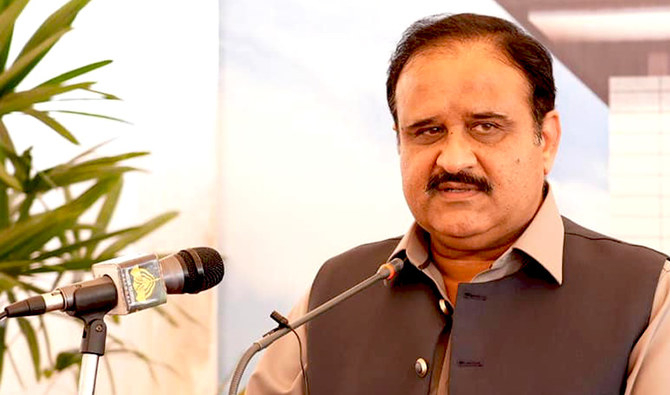ISLAMABAD: Pakistani opposition parties on Monday submitted a no-confidence motion against Chief Minister Usman Buzdar in the country's most densely populated Punjab province, an opposition lawmaker said, questioning his performance and saying he had lost majority in the provincial assembly.
Buzdar was handpicked by Prime Minister Imran Khan to be the province's chief minister in August 2018, though the decision was criticized by members of the ruling Pakistan Tehreek-e-Insaf (PTI) party, who believed Buzdar was not a known political figure and competent enough to manage the affairs.
However, PM Khan continued to support Buzdar who had won the provincial assembly seat from the remote Dera Ghazi Khan district in the 2018 general elections.
Currently, the prime minister is himself facing a no-confidence vote at the center. The opposition accuses him of mismanaging the country’s economy, foreign policy failures and poor governance.
"We have submitted the no-confidence motion against the Punjab chief minister after completing our homework," Rana Mashood Ahmad, a Pakistan Muslim League-Nawaz (PML-N) lawmaker and one of the movers of the motion, told Arab News.
"Our negotiations are underway with other political parties for the formation of the next set-up in the province and we will reveal all these details in the next three to four days."
Ahmad said his party wanted to rid the people of Punjab of "bad governance and rampant corruption," and they had decided to topple the "incompetent government" through constitutional and legal means.
"The MPAs [members of provincial assembly] enumerated in the attached two separate lists, of [opposition] PML (N) and PPPP [parties], duly signed by themselves request your honor to summon session of the Provincial Assembly of the Punjab under Article 154(3) read with Article 127 of the Constitution of the Islamic Republic of Pakistan to consider the notice of Resolution of no confidence against the Chief Minister of the Punjab, Sardar Usman Ahmed Khan Buzdar," read the opposition's letter to the Punjab Assembly speaker.
Responding to the development, Hassaan Khawar, a spokesperson for the Punjab government, said the chief minister would survive the no-trust motion.
"We will fight the no-confidence motion by the opposition," he said on Twitter. "Chief Minister Sardar Usman Buzdar is in constant touch with members of the [provincial] assembly. Our numbers are full, and the opposition will face a humiliating defeat."
Khawar expressed hope that the government's coalition partner in Punjab, the Pakistan Muslim League-Quaid (PML-Q), was not going to favor the opposition in the no-confidence vote.
"The Chaudhry brothers [of PML-Q] are well aware of how the Sharif brothers have been breaking promises in the past," he continued, while making a reference to the ongoing negotiations between the PML-Q leadership with the opposition PML-N party.
Buzdar has been a polarizing figure in the province, with members of a PTI dissident group and the government's coalition partners demanding his removal in recent months.
Prior to the filing of the no-confidence motion, local media reported Buzdar had prepared a summary to dissolve the assembly and was waiting to hear from the prime minister.
It was also said he had offered his resignation to the prime minister in recent days, but it was turned down.
















